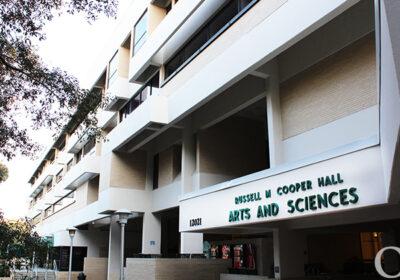Moffitt collaborates in world’s largest cancer database

ORACLE PHOTO/ADAM MATHIEU
About 8 million people die from cancer each year. This number is more than AIDS, malaria and tuberculosis twice combined, according to the Centers for Disease Control and Prevention.
While most medical universities research cancer, the findings on this multifaceted disease aren’t usually shared.
Now, the Moffitt Cancer Center and Ohio State University aim to collaborate to streamline and share the research through the Oncology Research Information Exchange Network (ORIEN), a system that amasses clinical data from over 100,000 patients to develop a larger understanding of cancer.
The genesis of ORIEN came from both researchers and administrators, said Dr. Charles Lockwood, senior vice president of USF Health and former dean of Ohio State’s College of Medicine.
“It provides an opportunity for folks who are trying to develop new treatment and diagnostic tests to have access to a vast treasure trove of patient material,” he said. “It could streamline and speed up the pipeline of new drugs and diagnostic tests for cancer for use in the general population.”
Moffitt and Ohio State’s collaboration is the first extensive research exchange for cancer, helping researchers share what they discover in studies, helping patients get individualistic health care and allowing trial medicines and treatment plans to match to people who are fit best.
“The ultimate goal is to find patients when they need treatment and offer treatment to them (that meets their individual needs),” Lockwood said.
To meet this goal, the database has a specialized search engine with a massive ORIEN data server.
“We’ve created this database where a lot of data comes from different groups, and all the data is harmonized,” Lockwood said. “We have a search tool for cohorts with specific mutations.”
With 3,500 medical records from Moffitt and 500 from Ohio State, the database cross-references data elements to match patients to clinical trials for targeted drugs with the highest chance of effect.
“It will allow drug trials to be conducted with much greater speed using much larger populations in a very coordinated and efficient way,” Lockwood said.
Dr. Dan Sullivan, the program leader of experimental therapeutics at the Moffitt Center, said statistical biological data would create patient profiles, delivering faster and more effective care.
“If we had a trial looking for a subset of patients, we could search the database for more patients to get in the study,” Sullivan said.
With already thousands of patients volunteering tissue and data for ORIEN, Sullivan said assembling data from Moffitt’s 100,000 patients and Ohio State’s 3,000 patients is an immense undertaking.
Though the endeavor to create a collaborative database is daunting, Lockwood said ORIEN leaders believe it will improve health care with each university lending its own strengths.
Sullivan said Ohio has expertise in lung cancer and certain leukemias, while Moffitt has done extensive work with lung cancer, melanoma and hematological malignancies.
While Ohio State has shared data with Moffitt in the past, Sullivan said the university recently signed an agreement to share data on a permanent level.
“I think it’s a rare example of two highly competitive academic centers collaborating for the benefit of the public,” Lockwood said.
Lockwood said other research institutions and hospitals might add to the database in the near future.
“There is a huge opportunity for all of our medical schools to start doing this, both clinically and research-wise, and in education,” he said. “Hopefully other deans will see merit in that and want to collaborate.”







